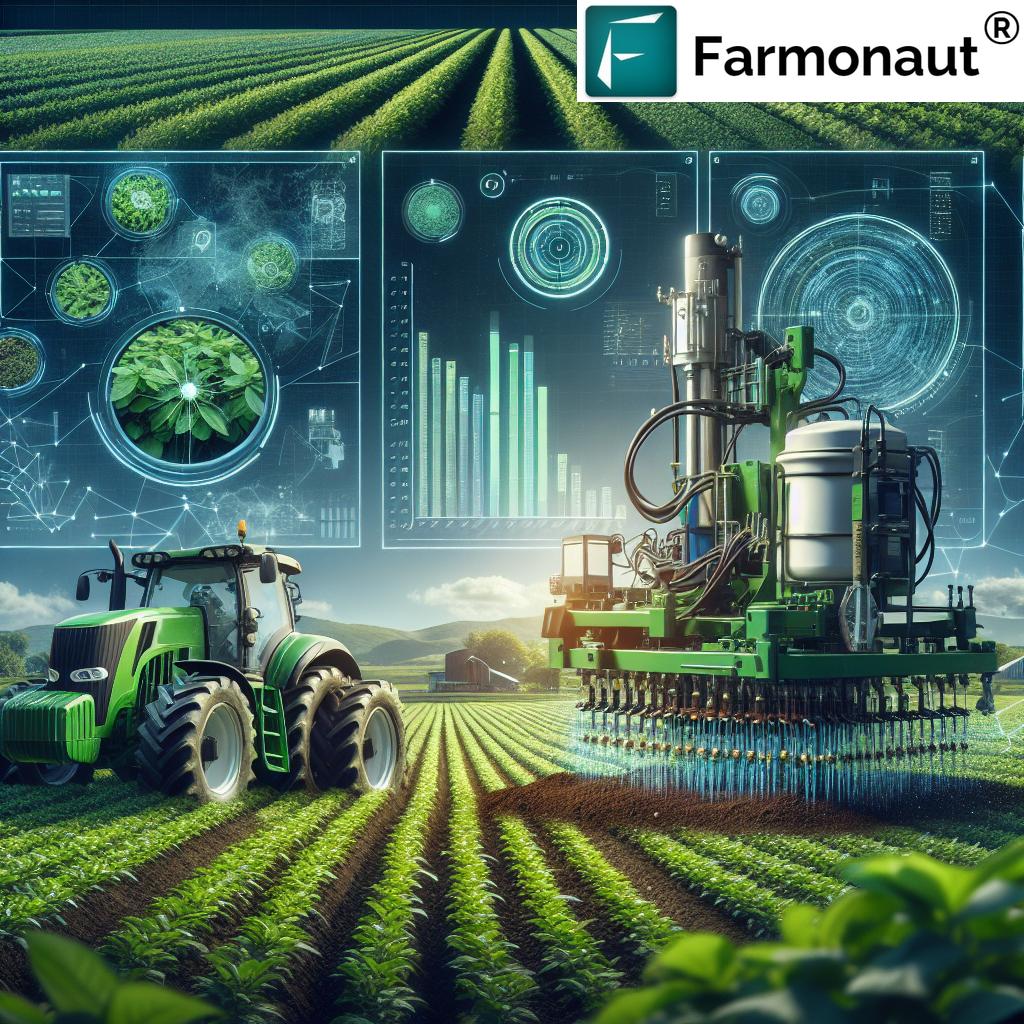Revolutionizing Arable Farming: How Sustainable Incentives and GIS Are Transforming Farm Management in 2023
“In 2023, the Sustainable Farming Incentive program introduced quarterly payments, potentially increasing cash flow for 70% of farmers.”
In the ever-evolving landscape of agriculture, 2023 has brought significant changes to arable farming, particularly through the introduction of sustainable farming incentives and the integration of advanced agricultural technology solutions. At Farmonaut, we’re at the forefront of this revolution, providing farmers with cutting-edge tools to navigate these changes and optimize their farm management practices.

The Sustainable Farming Incentive: A Game-Changer for Arable Farmers
The Sustainable Farming Incentive (SFI) program has undergone significant updates in 2023, reshaping the landscape of arable farm management. These changes are designed to promote sustainable farming practices while providing financial support to farmers who adopt environmentally friendly methods. Let’s delve into the key aspects of this transformative program:
- New Standards: The SFI has introduced updated standards for soil health, water management, and biodiversity conservation.
- Simplified Applications: The application process has been streamlined, making it easier for farmers to participate in the program.
- Quarterly Payments: A shift to quarterly payments has improved cash flow for participating farmers, enhancing financial stability.
These changes have significant implications for arable farmers, encouraging the adoption of sustainable practices such as improved crop rotation strategies and regular soil organic matter testing. At Farmonaut, we’ve observed a growing interest in our satellite-based crop health monitoring services, which align perfectly with these new SFI requirements.
GIS in Agriculture: Revolutionizing Precision Farming
Geographic Information Systems (GIS) have become an integral part of modern arable farming, and their role is only growing with the new SFI standards. At Farmonaut, we leverage GIS technology to provide farmers with unprecedented insights into their land and crops.
- Precision Agriculture Techniques: GIS enables highly accurate mapping of field boundaries, soil types, and crop health variations.
- Resource Optimization: By integrating GIS data with our AI-powered advisory system, farmers can optimize resource allocation, reducing waste and improving yields.
- Compliance Monitoring: GIS tools help farmers ensure compliance with SFI standards by accurately tracking and reporting on land use and conservation practices.
Our Farmonaut platform integrates seamlessly with GIS data, providing farmers with a comprehensive view of their operations. This integration is crucial for making informed decisions about crop rotation, nutrient management, and pest control strategies.
Smart Irrigation Systems: Water Management in the Age of Sustainability
“GIS-based precision agriculture techniques can reduce water usage in smart irrigation systems by up to 30% on arable farms.”
Water management is a critical component of sustainable arable farming, and smart irrigation systems are at the forefront of this effort. These systems, which often integrate with GIS and satellite data, offer several benefits:
- Water Conservation: By precisely targeting irrigation needs, these systems significantly reduce water waste.
- Crop Health Optimization: Proper water management leads to healthier crops and improved yields.
- Cost Reduction: Efficient water use translates to lower operational costs for farmers.
At Farmonaut, our satellite-based crop health monitoring services provide valuable data that can be integrated with smart irrigation systems, further enhancing their efficiency and effectiveness.
Soil Organic Matter Testing: The Foundation of Sustainable Arable Farming
Soil health is at the heart of the SFI program, and soil organic matter testing has become a crucial practice for arable farmers. Regular testing helps farmers:
- Assess Soil Health: Understanding the organic content of soil is key to maintaining its fertility and structure.
- Optimize Fertilizer Use: Accurate soil data allows for precise nutrient management, reducing over-application of fertilizers.
- Sequester Carbon: Healthy soils with high organic matter content act as carbon sinks, contributing to climate change mitigation.
Farmonaut’s satellite imagery and AI-driven analytics complement soil testing efforts, providing farmers with a comprehensive understanding of their soil health across entire fields.
Explore Farmonaut’s API for advanced soil analysis
Agricultural Pest Management: A Sustainable Approach
Sustainable pest management is another key focus of the SFI program. Modern approaches to pest control in arable farming include:
- Integrated Pest Management (IPM): Combining biological, cultural, and chemical control methods to minimize pesticide use.
- Precision Application: Using GIS and drone technology for targeted pesticide application, reducing overall chemical use.
- Biological Control: Encouraging natural predators and using biopesticides as alternatives to synthetic chemicals.
Farmonaut’s crop health monitoring services help farmers identify pest outbreaks early, enabling more timely and targeted interventions.

Crop Rotation Strategies: Enhancing Soil Health and Pest Control
Effective crop rotation is a cornerstone of sustainable arable farming, offering numerous benefits:
- Soil Health Improvement: Different crops have varying nutrient requirements, helping to maintain soil balance.
- Pest and Disease Control: Rotating crops can break pest and disease cycles, reducing reliance on chemical controls.
- Yield Optimization: Well-planned rotations can lead to improved yields and crop quality.
Our Farmonaut platform offers tools to help farmers plan and optimize their crop rotations, taking into account soil health data and historical crop performance.
Check out our API Developer Docs for crop rotation planning
Farm Subsidy Programs: Navigating the New Landscape
The introduction of the SFI has changed the landscape of farm subsidy programs. Key points for arable farmers to consider include:
- Transition from Basic Payment Scheme (BPS): Understanding how the SFI complements or replaces existing subsidies.
- Eligibility Criteria: Familiarizing themselves with the new requirements for receiving SFI payments.
- Payment Rates: Analyzing the potential financial benefits of participating in the SFI program.
At Farmonaut, we’re committed to helping farmers navigate these changes, providing tools and insights that align with the new subsidy landscape.
Nutrient Management Plans: Optimizing Inputs and Outputs
Effective nutrient management is crucial for sustainable arable farming and is a key component of the SFI program. A well-designed nutrient management plan helps farmers:
- Reduce Input Costs: By applying fertilizers more efficiently, farmers can lower their input expenses.
- Minimize Environmental Impact: Proper nutrient management reduces the risk of nutrient runoff and water pollution.
- Improve Crop Quality: Balanced nutrition leads to healthier crops and better yields.
Farmonaut’s satellite-based crop monitoring services provide valuable data for creating and refining nutrient management plans, ensuring that farmers can make data-driven decisions about fertilizer application.
The Role of Technology in Sustainable Arable Farming
As we navigate the changes brought by the SFI and other sustainable farming initiatives, technology plays an increasingly crucial role in arable farm management. At Farmonaut, we’re at the forefront of this technological revolution, offering solutions that include:
- Satellite-Based Crop Monitoring: Real-time insights into crop health and development.
- AI-Powered Advisory Systems: Personalized recommendations for crop management based on data analysis.
- Blockchain-Based Traceability: Ensuring transparency and trust in the agricultural supply chain.
- Weather Forecasting and Analysis: Helping farmers make informed decisions about planting, harvesting, and crop protection.
These technologies not only help farmers comply with SFI standards but also improve overall farm efficiency and profitability.
Comparison of SFI Standards and Their Impact on Farm Management
| SFI Standard | Focus Area | Estimated Payment (£/ha/year) | Required Practices | Environmental Benefits | Technology Integration | Compliance Challenges |
|---|---|---|---|---|---|---|
| Arable and Horticultural Soils | Soil Health | £22 – £40 | Soil testing, cover crops, reduced tillage | Improved soil structure, reduced erosion | GIS, soil sensors | Adapting to new tillage practices |
| Improved Grassland Soils | Pasture Management | £28 – £58 | Diverse sward, rotational grazing | Increased biodiversity, carbon sequestration | Satellite imaging, grazing management apps | Balancing livestock needs with soil health |
| Moorland and Rough Grazing | Habitat Conservation | £10 – £45 | Sustainable stocking rates, habitat restoration | Protected wildlife habitats, water regulation | Drone surveys, wildlife tracking systems | Managing diverse landscapes effectively |
This table provides a clear overview of how different SFI standards impact various aspects of farm management. It’s evident that each standard requires specific practices and technologies, all aimed at promoting sustainability and environmental stewardship.
The Future of Sustainable Arable Farming
As we look to the future, it’s clear that sustainable arable farming will continue to evolve, driven by a combination of policy incentives, technological advancements, and environmental imperatives. Key trends we anticipate include:
- Increased Adoption of Precision Agriculture: More farmers will leverage technologies like GIS and AI to optimize their operations.
- Focus on Carbon Sequestration: Arable farming practices that enhance soil carbon storage will gain prominence.
- Integration of Renewable Energy: Many farms will incorporate solar or wind energy to reduce their carbon footprint.
- Emphasis on Biodiversity: Farming practices that promote diverse ecosystems will become more widespread.
At Farmonaut, we’re committed to staying at the forefront of these trends, continually evolving our services to meet the changing needs of arable farmers.
Conclusion: Embracing Change for a Sustainable Future
The transformation of arable farming through sustainable incentives and advanced technologies represents a significant opportunity for farmers to improve their operations while contributing to environmental conservation. By embracing these changes and leveraging tools like those offered by Farmonaut, arable farmers can position themselves for success in this new era of agriculture.
We encourage all arable farmers to explore the possibilities offered by the SFI program and to consider how technologies like satellite-based crop monitoring, GIS, and AI-driven advisory systems can enhance their farm management practices. Together, we can build a more sustainable and profitable future for arable farming.
Frequently Asked Questions
- What is the Sustainable Farming Incentive (SFI)?
The SFI is a government program designed to reward farmers for implementing environmentally friendly practices on their farms. It offers financial incentives for activities that improve soil health, water quality, and biodiversity. - How can GIS technology benefit arable farmers?
GIS technology allows for precise mapping and analysis of farm land, enabling farmers to optimize crop placement, manage resources more efficiently, and make data-driven decisions about farm management practices. - What are the main benefits of implementing smart irrigation systems?
Smart irrigation systems can significantly reduce water usage, lower operational costs, and improve crop health by providing precisely targeted irrigation based on real-time data and weather forecasts. - How does Farmonaut’s technology integrate with sustainable farming practices?
Farmonaut’s satellite-based crop monitoring and AI-driven advisory systems provide farmers with valuable insights that align with sustainable farming practices, helping them optimize resource use, improve crop health, and comply with SFI standards. - What are the key challenges in transitioning to more sustainable arable farming practices?
Common challenges include initial investment costs, adapting to new technologies, changing long-established farming practices, and ensuring that sustainable practices remain economically viable in the long term.
By addressing these questions and embracing sustainable practices, arable farmers can navigate the changing landscape of agriculture with confidence, ensuring both environmental stewardship and economic success.






